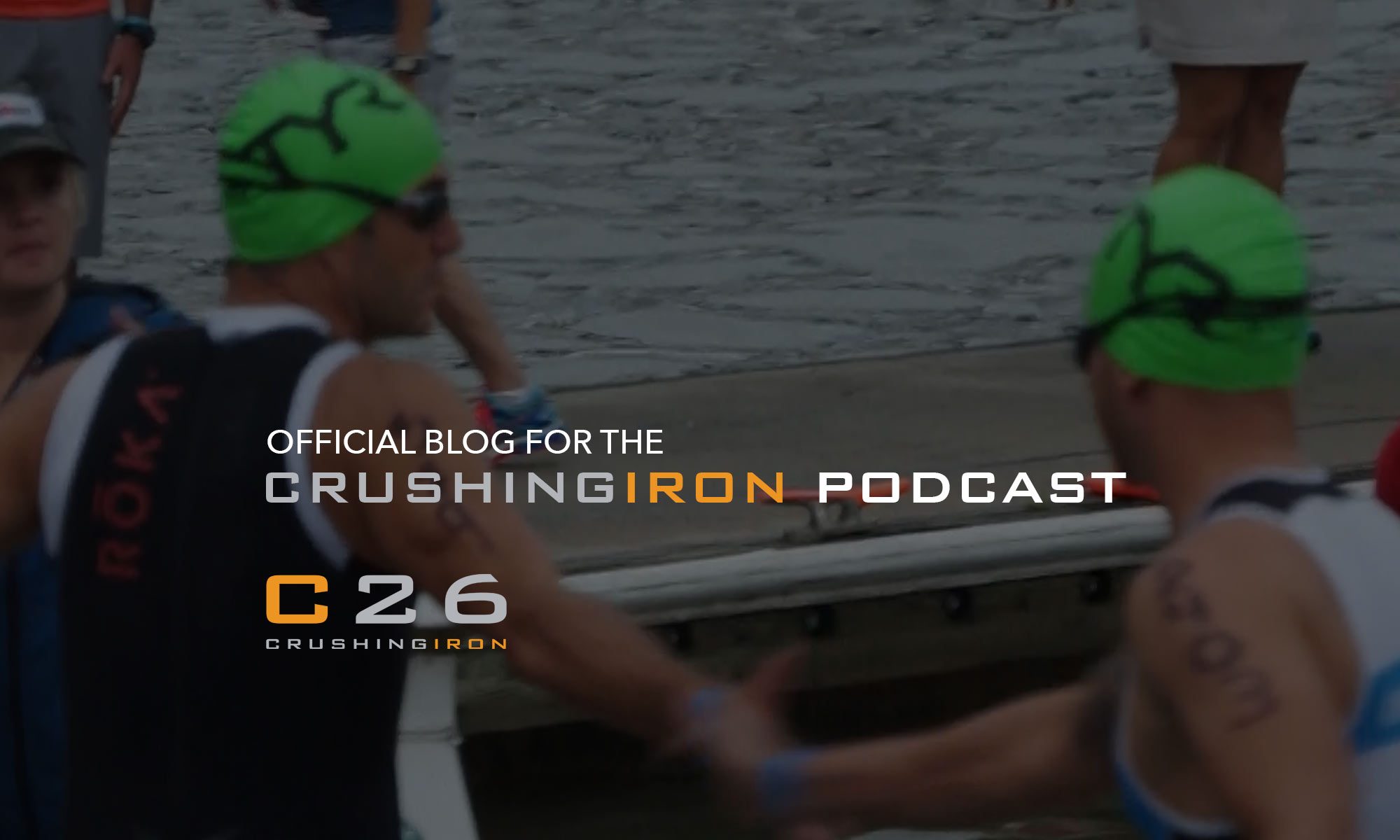For more information on our Community and Coaching, please check out C26Triathon.com
Crushing Iron Podcast #341 – How Our Insecurities Affect Our Training

We get into the sport to grow and become more confident, but . . . what do we do in those weak moments? The best athletes (and people) are always learning. Today, we look at a lot of examples we experience in coaching and how we approach insecurities that pop up in training. The stress of missing workouts, injuries, worry about not being ready, judging ourselves too harshly, etc. Training should be a way to become more whole and not judge ourselves by comparison. Learn your limits and how to approach them in a positive way.
Key Takeaways from this podcast:
- Do you think you’ll be ready for your race? This is always a mystery and while we don’t know for sure, we suggest that you answer “yes.”
- The obsession with wanting to know and predict. We all want to know our times or performances ahead of time, but remember, you could be selling yourself short by convincing yourself you’ll race at one pace, but possibly be ready for something faster.
- Adding “judgements to our plate.” The object is to improve and putting too much unnecessary weight on ourselves can cause tension that is only counter productive to the big picture.
- Do you need to do MORE? It’s easy to get caught in the trap that more is better, but training is like building a recipe. You want it to be consistent and wouldn’t add a bunch of extra ingredients to the mix.
- Making up missed workouts. Missed workouts is a huge source of stress for many athletes. Many times they can be made up, but not at the expense of putting too many hard workouts together. It might be best to think of making up with a recovery workout.
- Does not getting a PR mean you’re slower? Race times can be affected by many variables and just because you didn’t set a PR doesn’t mean you’re getting slower. Sometimes teams lose games because they played bad. They try to learn what they did wrong and get better.
- Was this session good enough? How do you judge your sessions? Harshly? Against yesterday or some target you cooked up in your mind? There’s really no sense in worrying over something that is already done.
- Who are you letting down? You should never have to worry about letting down your coach. A coach/athlete relationship should be a bond focused on getting better together.
- Do you think that race is a good idea? Are you loading your calendar because you are bored and need the excitement or because it makes sense? Look at what’s going on around you and decide it a race fits into the big picture.
- The endless puzzle. Most puzzles come to an end, but triathlon is an endless equation of problem solving. The problems may change each year, but they will always be there and your best mindset is to accept and appreciate learning mode.
- You just don’t know. Expectations are future resentments. Do the best you can today because you never know what race day will hold. Cross that plank when you get there.
- Are you where you thought you’d be? Life has a way of throwing curveballs and it’s best to adjust and go with the flow. It’s very hard to predict how much we will improve over time. Often we end up right where we should be whether we think so or not.
- Over judging yourself. You likely have enough going on without treating yourself too harshly. Think of this as the reverse of the Golden Rule. Many times we treat others with more forgiveness than we do ourselves.
- You shouldn’t be stressed about something that gives you joy. This is the cornerstone of “playing triathlon.” It is our hobby and should make us feel better and happier; not add stress. Workout in a way that brings you joy.
- The ability to take days off. Simply put . . . when you think you need or want an off day. Take one. Especially if you are getting sick or feel deep fatigue or there is a lot going on in your life. This is a key to success and a good indicator of confidence.
- The three P’s of stress. Physical. Professional. Personal. All stress matters and should be valued in the equation of being a successful triathlete.
- Training to heal or be whole. This is the epitome of training by feel. Sick or have a niggle? Train to an effort that helps the blood flow and works to heal your body. It’s a fine line and this can be the equivalent of Zone 0 for a lot of people. Movement as medicine.
- Learning from overtraining. Sometimes we have to push the limits to figure out what we’re capable of and this can leave us on the ground gasping for breath. But worse, it takes us out for a few days and disrupts training. When that happens, it’s our job to learn and remember that feeling so it doesn’t become a habit.
- Leaving wiggle room for life. The lesson here is to recognize that life takes energy and you have to save some for things like work, family, and other personal interests. Overtraining or stressing about training can really take a toll on things we love to do outside the sport. Respect yourself in the whole.
- Depression and anxiety. Many of us came to triathlete to be happier and healthier. If it’s adding more stress and making you unhappy, now is a great time to step back, sit with yourself and figure out how to find better balance.
For more information on our Community and Coaching, please check out C26Triathlon.com
Email: Coach Robbie: [email protected] Mike: [email protected]


